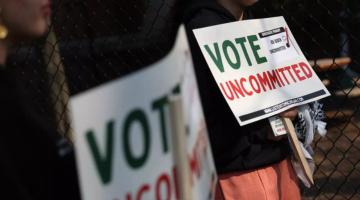A sign at Muhlenberg College, in Allentown, Pa., on March 2, 2011. Photo: Matt Rourke/AP
Maura Finkelstein was terminated by Muhlenberg College for an Instagram repost.
Originally published in The Intercept.
Maura Finkelstein never hid her support for Palestinian liberation during her nine years working as a professor of anthropology at Muhlenberg College, a small liberal arts school in Allentown, Pennsylvania.
“I have always had an ethical practice of making sure that I include Palestine in my teaching,” Finkelstein told me. “It was never outside the bounds of what I do.”
For Finkelstein, who is Jewish, this was not always easy. More than 30 percent of Muhlenberg’s 2,200 students are Jewish, many of them vocal supporters of Israel.
Neither her longtime public support of Palestinians, however, nor the courses on Palestine she taught in her early years at the school prevented Finkelstein from earning tenure in 2021. Following the arduous tenure process, professors are supposed to enjoy lifetime job security and robust safeguards of academic freedom. The bar for dismissal from a tenured academic position is by design meant to be extremely high, requiring justifiable cause.
In late May, however, Muhlenberg told Finkelstein that she was fired. The reason? She had shared, on her personal Instagram account, in a temporary story slide, a post written not by herself but by Palestinian poet Remi Kanazi calling for the shunning of Zionist ideology and its supporters.
“Do not cower to Zionists,” Kanazi wrote on January 16. “Shame them. Do not welcome them in your spaces. Why should these genocide loving fascists be treated any different than any other flat out racist.” At the time, Israel had already killed over 22,000 Palestinians in Gaza, the majority of whom were women and children.
For Finkelstein’s repost of Kanazi’s words, the college determined that their employee of nine years had violated its equal opportunity and nondiscrimination policies.
“The College at all times follows its mission, policies and procedures with respect to matters arising under our Equal Opportunity and Nondiscrimination Policy and the Faculty Handbook,” said Todd Lineburger, Muhlenberg’s vice president for communications. “Per those policies and procedures, the College does not comment on confidential matters.”
“The First Case”
In this time of extraordinary repression in academia, Finkelstein appears to be the first professor to be dismissed from a tenured job over anti-Zionist speech since the immediate aftermath of the September 11 attacks. Her dismissal sets a grim new precedent against a backdrop of right-wing attacks on higher education nationwide. As The Intercept has reported, numerous professors without the protection of tenure have faced the loss of work in apparent retaliation for speaking out against Israel’s genocidal war and apartheid regime. Hundreds of students have faced and continue to face grave disciplinary consequences for participating in Gaza solidarity encampments and protests.
In the last 11 months, other tenured professors have been suspended and investigated for making strong criticisms of Israel and Zionism in their extramural speech — statements made outside the classroom.
In 2003, the University of South Florida fired tenured computer science and engineering professor Sami Al-Arian, who is Palestinian, following remarks he made on Fox News about Israel. The school claimed it dismissed Al-Arian — who later faced a controversial prosecution and conviction — over campus safety concerns, but academic freedom advocates at the time condemned his firing as an act of censorship and discrimination.
In 2014, in the closest precursor to Finkelstein’s case, Palestinian American scholar Steven Salaita sued the University of Illinois for firing him two weeks before he was to begin teaching in a tenured position. The move came after his tweets criticizing Israel’s bombardment of Gaza drew right-wing media censure. The university settled with Salaita for $845,000 after public records requests revealed that the administration had been responding to pressure from wealthy donors to fire him.
Until Finkelstein, however, no other tenured professor has reported losing their long-held job for speech or expression relating to Israel–Palestine, let alone sharing a social media post.
“This is the first case that we’ve seen,” said Anita Levy, senior program officer at the American Association of University Professors, a nonprofit organization that advocates for faculty rights and academic freedom and seeks to hold higher education institutions accountable when standards are violated. “The apparent violations of her academic freedom are quite egregious, especially because they appear to primarily involve her posts on social media, what we would call her extramural speech.”
Levy said, “We are taking this case seriously.”
Repression and workplace retaliation are not somehow worse in Finkelstein’s case by virtue of her tenured position; all academic workers should enjoy the freedom that tenured faculty get. Yet the firing of a tenured professor over an anti-Zionist Instagram repost signals the extent to which institutions of higher education are willing to betray their own purported standards to bend to intellectually dishonest, conservative pro-Israel narratives.
Pressure Campaign
Muhlenberg’s decision to dismiss Finkelstein did not begin and end with the Kanazi Instagram story, which she posted in mid-January. It followed monthslong efforts aimed at pressuring the college to remove the professor, with online crusades primarily led by anonymous Muhlenberg alumni.
Finkelstein was the subject of a campaign of thousands of anonymous, bot-generated emails sent every minute for over 24 hours to the school’s administrators — as well as local news outlets and politicians — demanding the professor’s removal and accusing her of “Jew hatred.” Finkelstein said she was told by college leadership that numerous families of students had called to express concern about her position. A Change.org petition started in late October by unnamed “Muhlenberg College Alumni and Supporters” called for Finkelstein’s firing over allegedly “pro-Hamas” rhetoric; it gained over 8,000 signatures.
“I think that the pressure from donors and alums was so intense that I became a huge liability,” Finkelstein said.
The examples of Finkelstein’s allegedly “dangerous” speech listed on the petition include an email the professor sent to Muhlenberg students, staff, and faculty on October 10, in which she called the October 7 attacks “devastating” and wrote, “We must mourn all civilian deaths.” The focus of Finkelstein’s email, however, was to alert the college community that Israel was already bombing Gaza with “airstrikes of unprecedented intensity” and had threatened to cut off basic resources to the imperiled territory.
“For Palestinians in Gaza, Israel’s acts of revenge will likely result in absolute annihilation,” Finkelstein wrote. “Muhlenberg can be a hard space to talk openly about and grieve Palestine and Palestinians. Please know that there are safe spaces on campus – feel free to reach out to me if you need to.”
A screenshot of the email featured in the Change.org petition as a purported example of the threat Finkelstein posed to Jewish students.
The petition also featured screenshots of posts from Finkelstein’s personal social media accounts, none of which name Muhlenberg College. The posts decry Israel as an occupying force and accuse the state of genocide, a claim deemed plausible by the International Court of Justice. None of Finkelstein’s posts are directed at Jewish people — students or otherwise — for being Jewish.
Israeli Military Fundraising
The petition also drew attention to another key moment in Finkelstein’s tensions with the college in the previous 11 months: her reaction to a fundraising campaign for the Israeli military promoted on campus. Finkelstein told me that on October 17, on leaving her classroom, she was shocked by a display table newly laid out by Hillel.
“You can help raise money for various war efforts in Israel,” a sign on the table read, followed by QR codes linking to campaigns, including one to raise money for the Israeli military. Finkelstein did not immediately post publicly about the fundraiser, but emailed the school’s president, chaplain, and director of Hillel.
“How, in good conscience, can the college allow for this to be displayed to our students? The Israeli military just bombed a hospital in Gaza, killing 500 people,” she wrote. “I think this is an absolute disgrace. I hope it will be taken down ASAP.” Following several complaints to university leadership, Finkelstein was, she said, told that the Hillel students had a right to fundraise for whichever cause they wanted.
“I asked if, since students had the right to fundraise for genocide, whether I or anyone else — other faculty, students — had the freedom to write about it, and was told yes,” said Finkelstein. The following day, she posted a picture of the fundraiser sign to her X and Instagram accounts, without naming Muhlenberg as the location. “Students raising money for genocide,” she wrote. “Grief won’t be extinguished by revenge — ceasefire now.”
This post — a complaint about fundraising on campus for a foreign military that was already in the process of killing civilians en masse — was featured in the Change.org petition as an example of Finkelstein’s “pro-Hamas rhetoric and blatant classroom bias against Jewish students.”
“I was very overwhelmed by the petition,” Finkelstein told me. “People on social media were publishing where my office was on campus.”
She said she received anonymous rape threats and messages from people saying they watched her while she walked her dog.
Complaints
Throughout the fall semester, Finkelstein was called into regular meetings with Muhlenberg’s provost Laura Furge and Jennifer Storm, the school’s Title IX officer. “I was constantly being asked to tell them what I have been teaching in my classes, what I have been saying to my students, and that students are feeling really unsafe,” Finkelstein said.
Administrators told her that “multiple” students from her classes complained, she said. Finkelstein told me that she later learned, however, through an independent investigation ordered by the college into her conduct, that only one of her previous students had complained about her, and that complaint was never pursued.
The formal complaint that was pursued — and eventually led to her termination — was filed by a student Finkelstein said she had never taught or even met. This complaint focused solely on Finkelstein’s temporary Instagram story, which reposted Kanazi’s call for people to “shame” Zionists.
According to Finkelstein, the meetings with the provost and Title IX officer felt like facing a series of moving goalposts in which she struggled to gain clarity. On top of questions over her teaching content, Finkelstein said she was asked about her extramural writing, including a short essay published in late October titled “Never again means never again for anyone,” speaking from her position as an anti-Zionist Jew.
“Never forget,” she wrote of the central demand of Holocaust memory, “should turn all Jews into activists on behalf of the Palestinian people.” She told me that the provost called the essay “biased” and asked her to ensure that her extramural writing of this sort never mentions her affiliation with Muhlenberg, which it had not.
“It felt as though the administration needed to get rid of me, and they were trying to first build a case around my teaching and that fell apart,” Finkelstein said. “Then all of a sudden there was great concern over things that I had published.”
“An Icy Tundra”
Finkelstein believed her troubles with the school had “fizzled out” over the winter break, especially with international criticisms of Israel growing. On January 17, however, the first day of the spring semester, she was informed by the provost that she was named in a federal Department of Education complaint against the college.
The Department of Education’s Office for Civil Rights currently has 118 open Title VI investigations based on complaints filed since October 7, which fall under the category of “shared ancestry” discrimination. These cases cover alleged incidents of antisemitism, as well as anti-Muslim and other religious discrimination.
To file a complaint, a person doesn’t need to be affiliated with the institution in question. As The Intercept previously reported, one man, Zachary Marschall, the editor of the right-wing site Campus Reform, is responsible for over 10 percent of the open case complaints, according to a database of the complaints and investigations put together from public data by the Jewish Telegraphic Agency.
As listed in the database, the investigation into Muhlenberg dates to January 16 and remains open. The complaint, as summarized in the database, is attributed to a “Jewish member of campus” who is not named. Finkelstein is not explicitly named in the investigation description either, but the database says, “The complaint letter concerns a Jewish anti-Zionist professor on campus who has written articles praising Hamas and engaged in other behavior that Jewish students and alums find harmful to Jewish students. The letter seeks the professor’s removal.”
Finkelstein shared Kanazi’s “do not cower to Zionists” post on Instagram on the evening of January 17, after her call with the provost informing her about the Department of Education investigation. A week later, Finkelstein was placed on administrative leave.
“I was barred from classes, locked out of my Muhlenberg email account, and prohibited from teaching for the remainder of the semester,” Finkelstein said. At this point, in response to an internal complaint with the college’s Title IX office, Muhlenberg hired a third-party investigator to carry out an investigation into whether the professor violated the school’s policies.
According to an article in the Muhlenberg student paper at the time, students enrolled in Finkelstein’s classes were given scant information about her suspension, aside from an email from the provost on January 24 saying their professor was on leave.
“I was immediately upset with the college, as there were zero updates as to what was happening,” one anonymous student told The Muhlenberg Weekly. “[F]rom the limited information that I do know, it seems like a heinous violation of Dr Finkelstein’s academic freedom, something which Muhlenberg claims to pride itself on having.”
Faculty colleagues who sought further details on the situation also reported feeling left in the dark.
“We weren’t allowed to ask questions, we weren’t given information,” Muhlenberg professor of sociology, Janine Chi, told me.
“It has been chilling,” she said of the school’s treatment of Finkelstein, then reconsidered: “I used the word chilling in the Fall. I think at this point I will call it an icy tundra.”
“Didn’t Seem to Understand”
While Finkelstein was put on leave, the third-party investigation into the case was conducted by D. Stafford & Associates, a consulting firm specializing in campus safety and law enforcement. The investigation, which concluded in April, found that Finkelstein’s Instagram repost rose to the level of violating the school’s equal opportunity, nondiscrimination policies, which can police extramural speech in addition to classroom conduct.
According to Finkelstein, the investigation deemed that the shared post “encouraged discriminatory behavior,” but that her posts did not amount to “severe, persistent, or pervasive” criteria necessary to constitute harassment.
For any conduct to count as a violation of the equal opportunity, nondiscrimination policy, it must relate to a protected class. The third-party investigators did not themselves conclude that Zionists constitute a protected class per se, but that it was Muhlenberg’s responsibility, using guidance from the Department of Education, to decide in the specific case whether the complainant identifying as a Zionist should be considered a part of a protected class “based on race, color, or national origin, including shared ancestry or ethnic characteristics.”
To find Finkelstein worthy of just-cause dismissal, Muhlenberg’s leadership had to infer that the professor was talking about a protected class — that when she talked about Zionism, she really meant Israelis and Jewish people.
Finkelstein told me that she had been explicit in meetings with administrators about what she meant when she used the term “Zionist”: that she strongly rejects claims that the term represents Jewish people, and that anti-Zionist Jews like herself oppose the maintenance of Israel as a Jewish-supremacist ethnostate.
“She didn’t seem to understand what I meant by Zionist,” Finkelstein said, recounting her experience of an October meeting with Furge, the provost. “And so I explained to her that Judaism is a religion and Zionism is a political ideology.”
Instead, Muhlenberg’s position aligned with a growing consensus of educational and governmental institutions that conflate anti-Zionism with antisemitism.
Palestine Exception
The findings of the third-party investigation were sent to a panel of three ostensibly impartial college staff and faculty, selected by the Title IX office and tasked with making recommendations. The panel found Finkelstein responsible for four counts of discrimination and harassment, and recommended “termination for just cause.” (The panel overturned the investigation’s finding that Finkelstein’s conduct did not constitute harassment.)
University leadership informed Finkelstein that her last day of employment would be on May 30. Finkelstein lodged two appeals through separate channels. In one case, an appeals officer appointed by the school administration upheld leadership’s decision in a September 16 ruling. School policy, according to the appeals officer’s letter, states that “the decision by the appeal officer is to be deferential to the original decision” — even prior to considering the evidence of the case. Finkelstein has also started an appeals process, to which she is entitled, through the school’s Faculty Personnel and Policies Committee.
“We do think that there would be a strong basis for litigation,” said Stacey Leyton, an attorney representing Finkelstein. “We would also look at other claims, including failure to protect Maura when she was herself being harassed for her views.”
“I have represented professors many times,” Leyton told me, “I’m not aware of any case that resembles this.”
By comparison, Leyton raised the cases of professors who had made objectionable claims and kept their jobs. One was tenured University of Pennsylvania law professor Amy Wax, who drew public ire, and even sanctions from her employer, following years of explicitly white supremacist, anti-immigrant extramural speech, including the claim that “our country will be better off with more whites and fewer non-whites.” (Wax was suspended this week over her comments.)
Leyton said, “You can see where that would directly affect the educational experience of her students. And she is still employed after three years of proceedings.”
The AAUP’s Levy sent a letter to Muhlenberg’s president on September 24, conveying concern about Finkelstein’s treatment by the college, questioning whether the school has adhered to its own regulations, and noting that “issues of basic concern to our Association remain, especially with regard to academic freedom.” The association is sending a committee of three consultants to Allentown, according to the letter, “to discuss the situation with Professor Finkelstein, other involved faculty members, and key members of the administration and board of trustees before preparing a report of findings.”
While other professors have unambiguously maligned protected classes and remained employed, Finkelstein lost her position for decrying an ideology and its adherents — and at a time when that ideology is used to justify an ongoing genocide, repress Palestinian freedom struggle, and silence criticism of Israel. Activists and scholars have long dubbed this the “Palestine exception to free speech.”
“As someone who has been active in support and solidarity of Palestinian people and Palestinian self-determination for decades, part of me is not surprised that this happened,” Finkelstein told me. “And part of me cannot believe that this happened.”
Natasha Lennard is a columnist for The Intercept. Her work has appeared in The Nation, Bookforum, and the New York Times, among others. She is the associate director of the Creative Publishing & Critical Journalism graduate program at the New School for Social Research in New York. She is the author of “Being Numerous: Essays on Non-Fascist Life.”



















